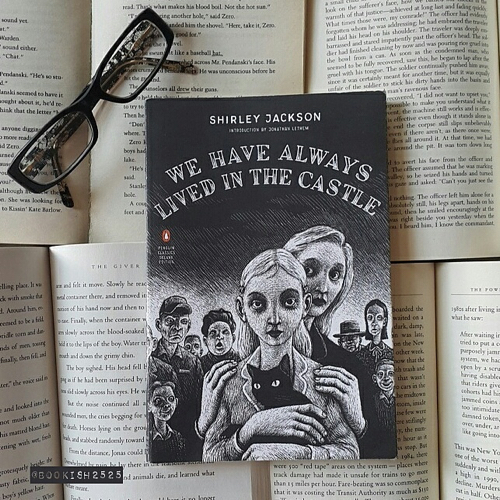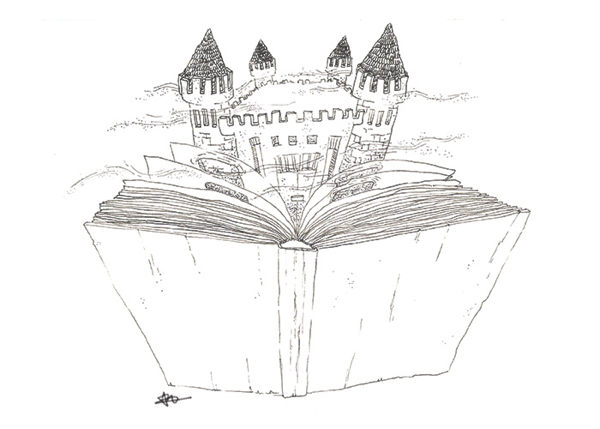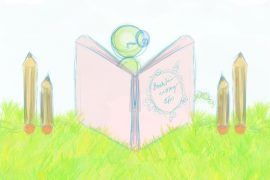Book Review on We Have Always Lived in The Castle by Shirley Jackson, published in 1962.

Gothic fiction genre is known by its gloomy atmosphere, isolated setting and psychological deviation. That, combined with elements of either suspense, supernatural or moral uncertainty. We Have Always Lived in the Castle was Shirley Jackson’s last work, a gothic American literature piece published in 1962. She is most famously known for her short story The Lottery, which was widely praised by critics. Her writing is extremely alluring, and you would have to be interrupted to be able to stop reading.
The story is told from the point of view of Mary Catherine Blackwood who lives in a house with her older sister Constance, who calls her Merricat, and her Uncle Julian. The story starts a few years after a tragedy had taken place. Merricat, being the unreliable narrator that she is, does mention it dismissively when she was done saying more “important” things, like how she wishes to have been born a werewolf. Right off the bat, you will learn that most of the Blackwood family is dead. Murdered.
The Blackwoods live right outside a nameless village in their fenced off land. Merricat states early on that “the people of the village have always hated us” but does not elaborate as to why. Out of necessity, Merricat ventures there twice a week for groceries and books. She ignores the children of the village as they cruelly chant:
“Merricat, said Connie, would you like a cup of tea?
Oh no, said Merricat, you’ll poison me.
Merricat, said Connie, would you like to go to sleep?
Down in the boneyard ten feet deep” (p 16)
Death, mental illness and self-imposed isolation are the most recurring themes throughout the story, emphasized in Merricat’s dark narrative, paranoid thinking, and odd mannerisms. Her taking pleasure in imagining people she hates die in painful ways is an example of that. “Whatever planned to be colorful lost its heart quickly in the village. The blight on the village never came from the Blackwoods; the villagers belonged here and the village was the only proper place for them. I always thought about rot when I came toward the row of stores; I thought about burning black painful rot that ate away from inside, hurting dreadfully, I wished it on the village.” (p. 6)
Even though these themes take turns in their surfacing, the other two will remain visible in your peripheral. It is intrigue at what Merricat will do next that will keep your nose in the book. This is not the type of story that climaxes at the reveal of the murderer’s identity; the reader can figure that out fairly early on. The real joy of this read is your constant trying to make sense of it all, especially that all you get to see is distorted. It is more than a thriller, a thought-provoking book, where happenings are open for multiple interpretations and really just make you itch for someone to discuss it with. My attitude towards change is largely pessimistic, I absurdly wish for the sameness of everyday life. In that I was able to sympathize with Merricat, except that she takes her dislike of change to a whole new level.

It’s 146 pages of pure thrill that you can read in a day and think about for days. Easy to read, hard to put down. You read with the feeling that the narrator of the story knows more than she lets on, pulling you in the story with her bewitching voice. We Have Always Lived in The Castle is a book many will find easy to relate to, with themes about family, death, happiness and especially change. If you have ever faced a turning point in your life, seeing Merricat and her sister cope with their nightmarish turning point is certainly inspiring.
This is a book you will enjoy re-reading, and the second read will offer a whole different experience, since you will see things with an understanding. This book is one of my first reads, and it has set me on the path of reading, helping me realize my preference for classics.




The real joy of this read is your constant trying to make sense of it all, especially that all you get to see is distorted. It is more than a thriller, a thought-provoking book, where happenings are open for multiple interpretations and really just make you itch for someone to discuss it with.
The books seems really interesting!! I've never been into a goth like genre before usually just me and my crimes! But if I ever do I'll definitely try this one.
Love the way you tied yourself to the novel it gives off credibility and your attitude makes the review even more awesome.
Keep it up!
I had my eyes on this book for a very long time but I knew deep down I won't end up buying it due to my lack of interest in the classic genre and also the cove gave me an eerie feeling. But after reading this review, I went running to my laptop. I really like how gothic fiction was described and lemme tell you, I'M INTRIGUED! I really want to meet this Mary and learn more about the story.
Thanks for sharing your thoughts, it really helped me get over the cover. Keep up the good work!